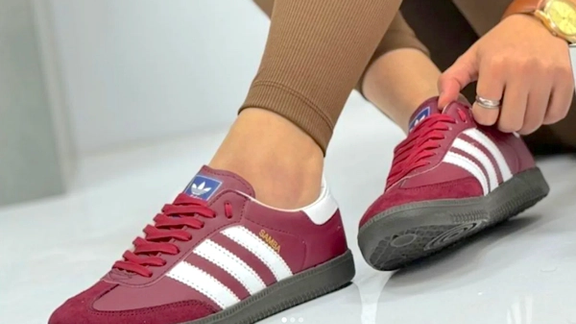Lined with chic cafes, these streets aren’t just about coffee; they’re unofficial runways where visitors are dressed to impress, turning casual spots into a parade of cutting-edge fashion.
One item, Adidas Samba shoes has emerged as the ultimate statement, a symbol of youth embracing global trends and modern fashion. The iconic sneakers complement the uncovered hair of young women whose appearance is their struggle—it’s been turned into that by their rulers’ incessant encroachment on their lives.
“What we wear, like our Sambas, is a statement,” says Sima, a young fashion journalist I talked to over an encrypted messaging app. The statement? “We know what’s out there, and we’re part of it too,” she adds.
“The government has tried for years to wrap Iranians in ideology and keep them apart from the rest of the world. But it has failed at every turn, and young women today are living proof of it.”
For those frequenting Tehran’s upscale cafes, fashion isn’t just about rebellion; it’s about belonging to a global culture. Wearing Sambas is a subtle yet powerful way to project a freer identity in a society that’s not too fond of individuality. The minimalist design and timeless appeal of Sambas makes it a perfect vehicle for that desire.
No wonder it’s become a craze. Oneat times taken too far.
Samba or out!
Recently, a new restaurant called Pasata caused controversy when some customers alleged they were denied service for not meeting their high fashion standards.
The restaurant—with its innovative twist on pasta and Instagrammable aesthetic—is a magnet for Tehran’s trendsetters. The hype is so intense that long lines form daily outside its doors, with diners eager to taste what some have called “the best pasta ever.”
But things took a strange turn when some customers claimed they waited for hours without being served. Rumors spread that Pasata catered only to the fashionable elite, and one diner even alleged she was turned away for not being stylish enough.
The chatter reached a new level when the young woman took to X to share her experience, creating a social media buzz. Another woman claimed she was only served after donning a pair of Samba sneakers.
Replicas republic
As popular as Sambas are, acquiring them is not easy. Western brands like Adidas are often unavailable due to sanctions and import restrictions.
“Original pairs are really expensive,” Sima, the fashion journalist, says. “There’s even a small black market for it. But most people buy replicas.”
The phenomenon is by no means limited to Sambas, of course.
Replicas are everywhere in Iran, not least because official brand stores are almost non-existent. Real brands are smuggled and sold at exorbitant prices. Even then, you cannot be sure they’re not replicas.
So for Sambas, at least, some turn to innovative local shoemakers who give them the iconic sneakers—or something closely resembling it—at a fraction of the price.
One way or another, you have to have a pair.
“It’s impossible to walk into a café like Lamiz these days and not notice Samba shoes everywhere.” Mina, a 25-year-old architect and self-proclaimed trendspotter, frequents some of Tehran’s hotspots for stylish youth.
Lamiz, a coffeehouse chain often compared to Starbucks for its interior design and urban vibe, has become a favorite gathering spot for young Iranians.
“You can always tell what’s trending by what people are wearing here,” Mina tells me on an encrypted call from the cafe. “Even the baristas are on trend. There are two girls and two guys and they all wear Sambas.”
A quiet revolution in style
While authorities continue to enforce Islamic guidelines, including mandatory head coverings, the reality on the streets tells a different story: a generation expressing individuality, freedom, and a connection to the wider world through their style.
It’s nothing short of revolutionary.
The cafés of Tehran, especially in the affluent neighborhoods like Tajrish, Farmanieh, and Shahrak-e-Gharb, have become vibrant spaces of freedom where young people gather to express themselves—in words and in looks.
Outfits here reflect a fascinating blend of individuality and global influences, with Samba shoes often standing out, paired with everything from minimalist trousers to bold, oversized jackets.
Most striking, however, is the absence of head coverings—a growing trend that gained momentum with the 2022 protests, the Woman, Life, Freedom movement.
The combination of free hair and Sambas is becoming a symbol of resistance and individuality, blending global fashion with a distinctly Iranian narrative of personal and cultural expression.
But resistance is a risky affair.
Young women not wearing headscarves can be harassed by fanatics or the police. Their cars are regularly stopped and towed. Many businesses, including the trendy cafés of northern Tehran, have been shut down by authorities for allowing women to enter without their mandatory hijabs.









